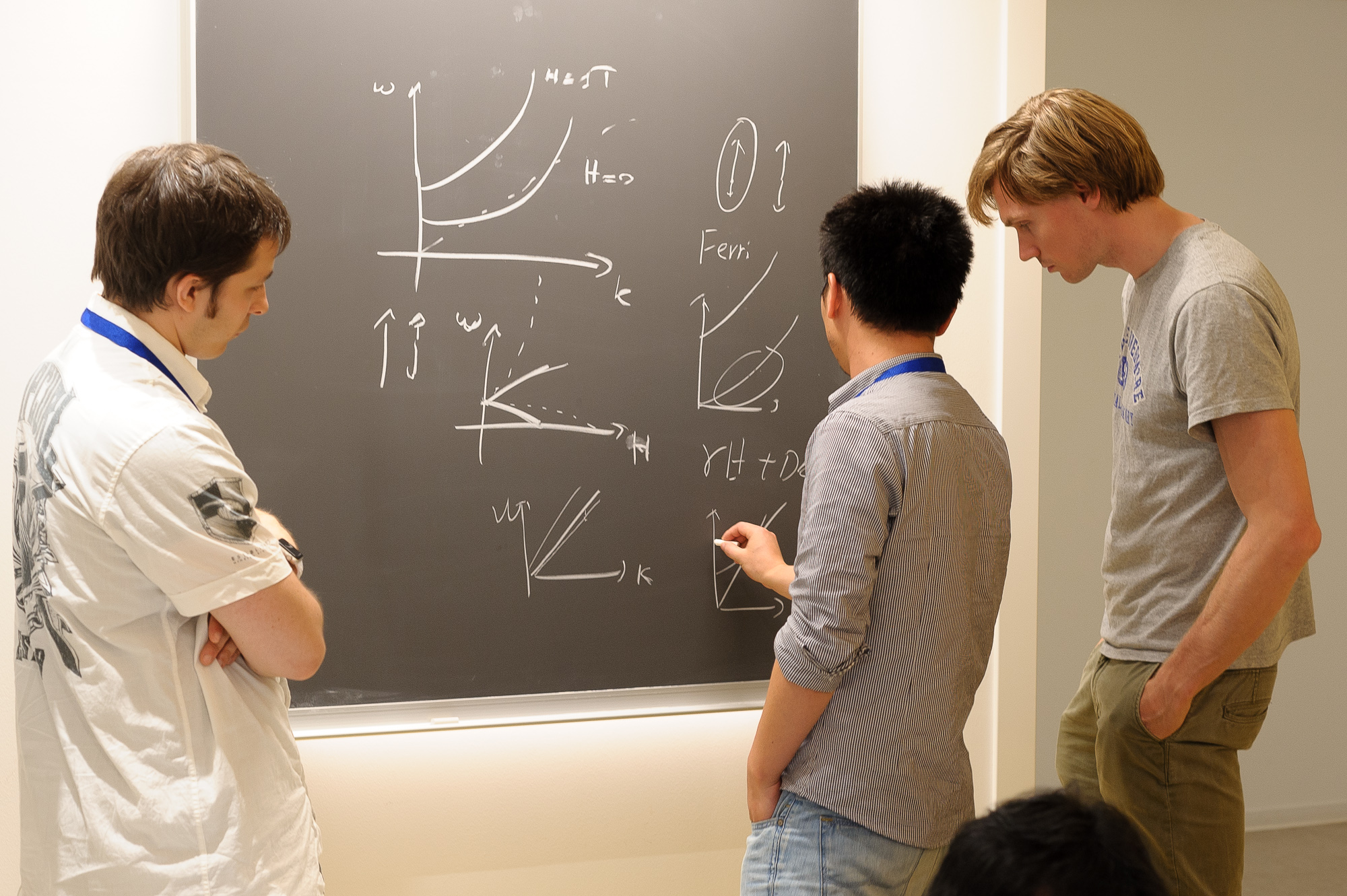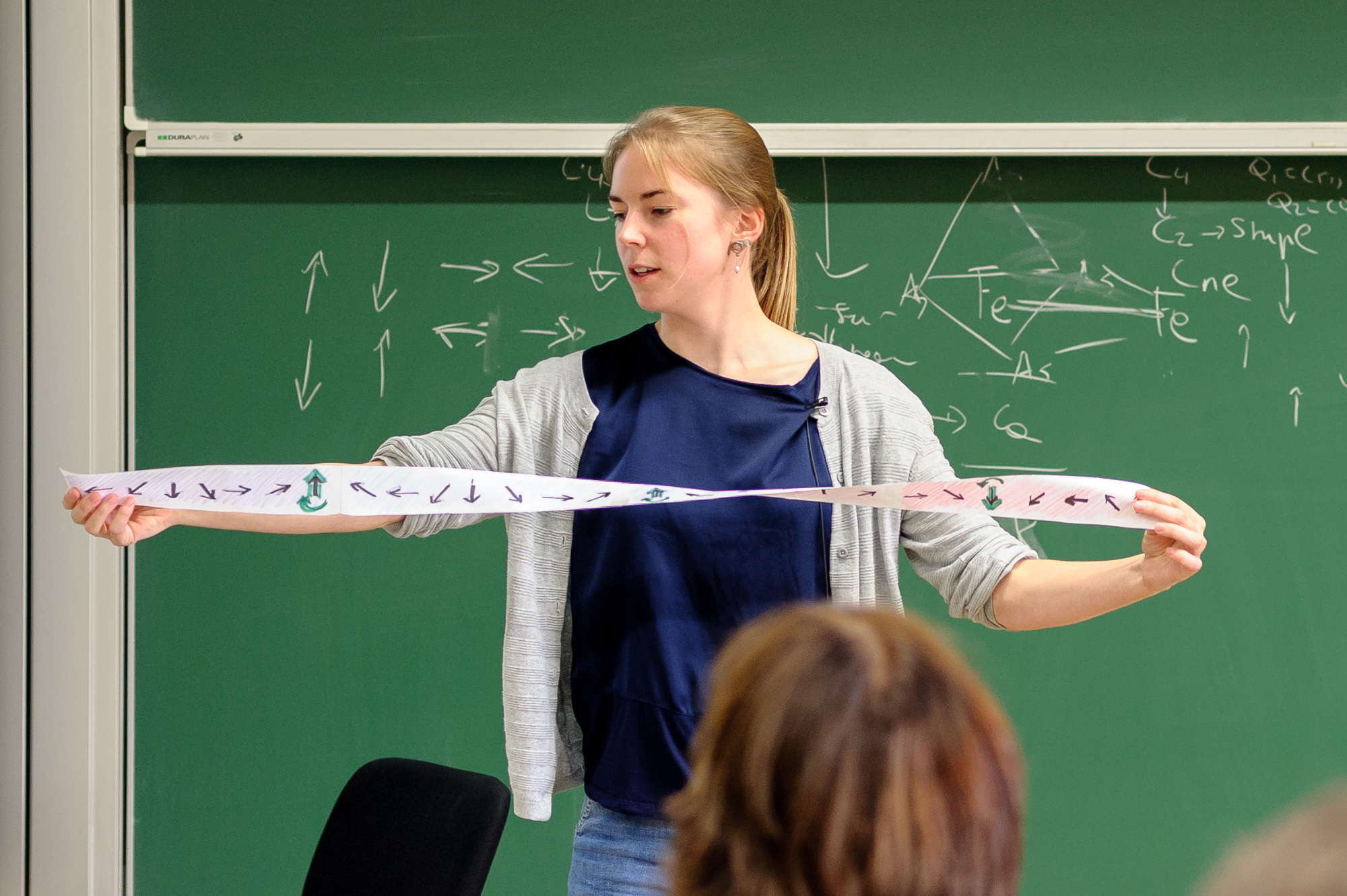Network-Meeting SPP2137 Skyrmionics
Mainz, Germany: July 11th 2017
List of Participants
|
Mainz, Germany: July 11th 2017
List of Participants
|
Mainz, Germany: July 31st – August 4th 2017
|
Mainz, Germany: July 25th - 28th 2017
|
Mainz, Germany: June 6th – 9th 2017
|
Mainz, Germany: May 30th - June 2nd 2017
|

Insulator spintronics – strong-coupling, coherence and entanglement
Magnetic insulators are extremely versatile materials. They’re used for fundamental research into magnetism and in real world devices. They have become a vital tool across many research disciplines to the extent that they are now micro-scale laboratories in their own right. The lack of charge currents in these materials allows for a very controlled environment where pure spin currents can flow and single magnons can be excited. However, nature is not so kind and the majority of magnetic insulators are a complex class of materials with many complications which must be understood.
This SPICE Young Research Leaders Workshop aims to bring together young scientific leaders who are interested in how magnetic insulators can be used to push the frontier of our understanding of basic science as well as technological frontiers such as spintronics and quantum computing. Specifically, this workshop will bring together researchers from the fields of insulator spintronics, magnon-polaritons and quantum magnetism to exchange ideas and discuss new ways in which magnetic insulators can be applied to fundamental research and applications.

In recent years the concepts of topology have entered strikingly all areas of physics, interlinking many previously unrelated areas of research. New topological materials and topological phases with exotic properties have been discovered at a rapid pace. However, these new phases are still being studied primarily within their own sub-disciplines of condensed matter, with not enough interaction among them to explore new emerging paths to hybrid and multifunctional advanced materials.
The workshop "Topology Matters" aims to bring together the top scientists in the fields of spintronics, superconductivity, topological insulators, and multiferroics in order to explore their connections via topology. The rapid developments in each of these fields, and the emerging importance of topology in all of them makes this workshop very timely.
Monday, September 25th |
|
|
Morning Session |
|
| 08:30 – 09:00 | Registration |
| 09:00 – 09:10 | Opening remarks |
| 09:10 – 10:10 | Hao ZHANG Majorana zero modes in semiconductor nanowires |
| 10:20 – 10:40 | Coffee Break |
| 10:40 – 11:10 | Francesco GIAZOTTO Realization of artificial Josephson topological materials via three-terminal proximity interferometers |
| 11:20 – 11:50 | Sophie GUERON Ballistic edge states in Bismuth nanowires revealed by SQUID interferometry |
| 12:00 – 13:30 | Lunch Break |
|
Afternoon Session |
|
| 13:30 – 14:30 | Ilya TOKATLY Charge-Spin Coupling in Superconducting Structures: Non-dissipative Magnetoelectric Effects |
| 14:40 – 15:00 | Coffee Break |
| 15:00 – 15:30 | Silvano DE FRANCESCHI On the ballistic one-dimensional character of semiconductor nanostructures for Majorana fermions |
| 15:40 – 16:10 | Kun-Rok JEON Towards magnetization-dynamics-driven superconducting spin currents |
| 16:20 – 16:40 | Coffee Break |
| 16:40 – 17:10 | Jagadeesh MOODERA Interface driven phenomena leads the way forward |
| 17:20 – 17:50 | Jasmin JANDKE Unconventional pairing versus phonon mediated superconductivity in single FeSe layers |
| 18:30 – 20:00 | Dinner |
Tuesday, September 26th |
|
|
Morning Session |
|
| 09:00 – 10:00 | Tero HEIKKILÄ Nonequilibrium effects in superconductors with a spin-splitting field |
| 10:10 – 10:40 | Charis QUAY HUEI LI Quasiparticle spin dynamics in out-of-equilibrium superconductors |
| 10:50 – 11:20 | Coffee Break & Poster Session |
|
Session Topic: Topological Superconductivity and Majorana fermions II |
|
| 11:20 – 11:50 | Ewelina HANKIEWICZ Unconventional superconductivity in topological insulators and on hexagonal lattices |
| 12:00 – 12:30 | Roland WIESENDANGER Bottom-Up Construction and Atomic-Level Characterization of Spin Chains on Superconducting Substrates for Topological Quantum Computation |
| 12:40 – 16:00 | Lunch Break & Poster Session |
|
Afternoon Session |
|
| 16:10 – 16:40 | Dimitri RODITCHEV Coherent quantum phenomena in ultimate 2D superconductors: A STM study |
| 16:50 – 17:30 | Coffee Break & Poster Session |
| 17:30 – 18:00 | Katharina FRANKE Yu-Shiba-Rusinov multiplets in magnetic adsorbates on a superconductor |
| 18:10 – 18:40 | Mikael FOGELSTRÖM Spontaneously broken time-reversal symmetry in d-wave superconductors |
| 19:00 – 20:00 | Dinner |
Wednesday, September 27th |
|
|
Morning Session |
|
| 09:00 – 10:00 | Yoshi MAENO Spin-triplet pair penetrstion into a ferromagnet in Sr2RuO4/SrRuO3-based junctions |
| 10:10 – 10:40 | Javier VILLEGAS Electron interference effects in cuprate superconductor/graphene junctions |
| 10:50 – 11:10 | Coffee Break |
| 11:20 – 11:50 | Dirk MANSKE Novel proximity and Josephson effect with triplet superconductors |
| 12:00 – 12:30 | Yossi PALTIEL Unconventional superconductivity induced in Nb by adsorbed chiral molecules: A simple way towards superconducting spintronics |
| 12:40 – 14:00 | Lunch Break |
|
Afternoon Session |
|
| 14:00 – 15:00 | Norman BIRGE Spin-triplet supercurrent and controllable phase states in Josephson junctions containing ferromagnetic materials |
| 15:10 – 15:40 | Jan AARTS Magnetic control over spin-triplet supercurrents |
| 15:50 – 16:20 | Matthias ESCHRIG New Avenues toward Complex Pairing States |
| 16:30 – 16:50 | Coffee Break |
| 16:50 – 17:20 | Elia STRAMBINI EuS/Al bilayers for future superconducting spintronics |
| 17:30 – 18:00 | Rina TAKASHIMA Spin torque induced by triplet supercurrent |
| 18:10 – 20:00 | Dinner |
Thursday, September 28th |
|
|
Morning Session |
|
|
Session Topic: Topological Superconductivity and Majorana fermions III |
|
| 09:00 – 10:00 | Felix VON OPPEN Topological superconductivity in chains of magnetic adatoms on superconductors |
| 10:10 – 10:40 | Julia MEYER Multi-terminal Josephson junctions |
| 10:50 – 11:10 | Coffee Break |
|
Session Topic: Spintronics with superconductors II |
|
| 11:10 – 11:40 | Mark BLAMIRE Superconducting spin valves and exchange coupling |
| 11:50 – 12:20 | Mario AMADO Structural and magnetic properties of superconductor / Yttrium Iron Garnet heterostructures with Bi and Nb |
| 12:30 – 13:30 | Lunch Break |
Monday, July 31st |
|
|
Morning Session Session Topic: Spin Transport & Quantum Magnetism |
|
| 08:30 – 09:00 | Registration |
| 09:00 – 09:15 | Jairo SINOVA, Mainz & Joseph BARKER, Tohoku Opening Remarks |
| 09:15 – 10:00 | So TAKEI, Queens College of the City University of New York Signatures of Pauli Blockaded Spin Transport Across Coupled Quantum Spin Chains |
| 10:00 – 10:45 | Akashdeep KAMRA, University of Konstanz Non-integer-spin magnonic excitations in untextured magnets |
| 10:45 – 11:15 | Coffee & Discussion |
| 11:15 – 12:00 | Cecilia HOLMQUIST, Linnaeus University Spin superfluidity in ferromagnets and antiferromagnets |
| 12:00 – 14:00 | Lunch & Discussion |
|
Afternoon Session Session Topic: Spin Transport & Quantum Magnetism |
|
| 14:00 – 14:45 | Kouki NAKATA, University of Basel Magnon Transport Both in Ferromagnetic and Antiferromagnetic Insulating Magnets |
| 14:45 – 15:30 | Coffee & Discussion |
Tuesday, August 1st |
|
|
Morning Session Session Topic: Strong-Coupling |
|
| 09:15 – 10:00 | James HAIGH, Hitachi Cambridge Laboratory Enhanced Brillouin light scattering in magneto-optical cavities |
| 10:00 – 10:45 | Hans HUEBL, Walther-Meissner-Institut Controlling the Collective Coupling in Spin-Photon Hybrids |
| 10:45 – 11:15 | Coffee & Discussion |
| 11:15 – 12:00 | Ka SHEN, Delft University of Technology Magnon-polaron transport in magnetic insulators |
| 12:00 – 14:00 | Lunch & Discussion |
|
Afternoon Session Session Topic: Spin Transport: Inhomogeneous magnetic textures |
|
| 14:00 – 14:45 | Se Kwon KIM, University of California Magnetic Domain Walls as Hosts of Spin Superfluids and Generators of Skyrmions |
| 14:45 – 15:30 | Mathias WEILER, Walther-Meissner-Institut Helimagnon resonances in an intrinsic chiral magnonic crystal |
| 15:30 – 16:15 | Coffee & Discussion |
Wednesday, August 2nd |
|
|
Morning Session Session Topic: Magneto-optical / Magneto-elastic coupling |
|
| 09:15 – 10:00 | Davide BOSSINI, The University of Tokyo Femtosecond quantum spin dynamics in antiferromagnets |
| 10:00 – 10:45 | Vitaliy VASYUCHKA, Technische Universität Kaiserslautern Spin Transport using Magneto-elastic Bosons |
| 10:45 – 11:15 | Coffee & Discussion |
| 11:15 – 12:00 | Peng YAN, University of Electronic Science and Technology of China Rotational Motion of Magnetic Skyrmions Driven by Optical Vortices via Orbital Angular Momentum Transfer |
| 12:00 – 14:00 | Lunch & Discussion |
|
Afternoon Session Session Topic: Spin Transport: Interfaces |
|
| 14:00 – 14:45 | Felix CASANOVA, CIC nanoGUNE Surface magnetization probed by spin Hall magnetoresistance |
| 14:45 – 15:30 | Juan-Carlos ROJAS-SANCHEZ, Institut Jean Lamour -CNRS/Univ. Lorraine Interfacial spin-orbitronics: large spin-charge current conversion in a-Sn topological insulator and potential for giant Spin Seebeck effect in YIG/a-Sn |
| 15:30 – 16:15 | Coffee & Discussion |
Thursday, August 3rd |
|
|
Morning Session Session Topic: Spin Transport: Antiferromagnets |
|
| 09:15 – 10:00 | Takahiro MORIYAMA, Kyoto University Spin orbit torque in antiferromagnets |
| 10:00 – 10:45 | Scott BENDER, Utrecht University Spin transport through antiferromagnetic insulators |
| 10:45 – 11:15 | Coffee & Discussion |
| 11:15 – 12:00 | Dazhi HOU, WPI-AIMR, Tohoku University Sign change of spin Hall magnetoresistance in Pt/NiO/YIG structures |
| 12:00 – 14:00 | Lunch & Discussion |
|
Afternoon Session |
|
| 14:00 | Excursion |
| 19:00 | Conference Dinner Restaurant Heiliggeist Mailandsgasse 11 55116 Mainz |
Friday, August 4th |
|
|
Morning Session Session Topic: Spin Transport |
|
| 09:15 – 10:00 | Ludo CORNELISSEN, University of Groningen Nonlocal magnon-polaron transport in yttrium iron garnet |
| 10:00 – 10:45 | Kei YAMAMOTO, University of Mainz Magnon spin current driven by stochastic fluctuations |
| 10:45 – 11:15 | Jairo SINOVA, Mainz & Joseph BARKER, Tohoku Closing Remarks |